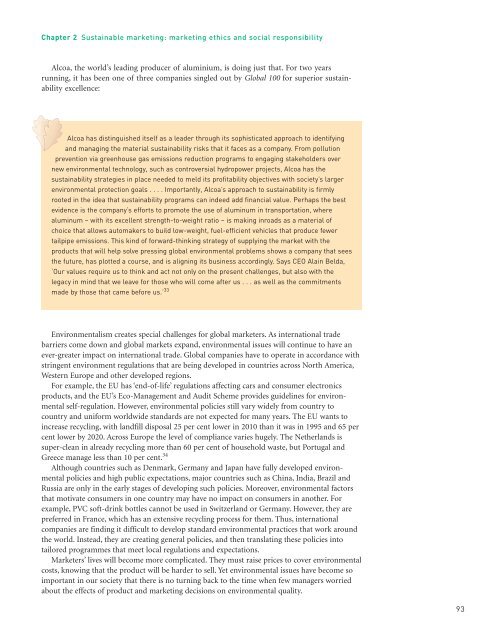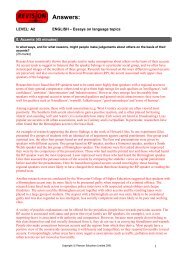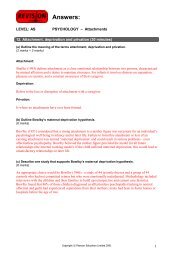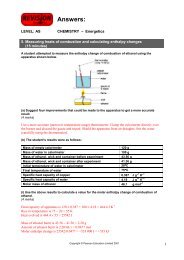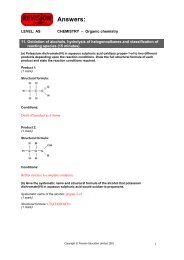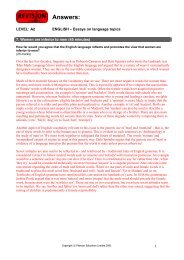The Dove Campaign for Real Beauty - Pearson
The Dove Campaign for Real Beauty - Pearson
The Dove Campaign for Real Beauty - Pearson
Create successful ePaper yourself
Turn your PDF publications into a flip-book with our unique Google optimized e-Paper software.
Chapter 2 Sustainable marketing: marketing ethics and social responsibilityAlcoa, the world’s leading producer of aluminium, is doing just that. For two yearsrunning, it has been one of three companies singled out by Global 100 <strong>for</strong> superior sustainabilityexcellence:Alcoa has distinguished itself as a leader through its sophisticated approach to identifyingand managing the material sustainability risks that it faces as a company. From pollutionprevention via greenhouse gas emissions reduction programs to engaging stakeholders overnew environmental technology, such as controversial hydropower projects, Alcoa has thesustainability strategies in place needed to meld its profitability objectives with society’s largerenvironmental protection goals . . . . Importantly, Alcoa’s approach to sustainability is firmlyrooted in the idea that sustainability programs can indeed add financial value. Perhaps the bestevidence is the company’s ef<strong>for</strong>ts to promote the use of aluminum in transportation, wherealuminum – with its excellent strength-to-weight ratio – is making inroads as a material ofchoice that allows automakers to build low-weight, fuel-efficient vehicles that produce fewertailpipe emissions. This kind of <strong>for</strong>ward-thinking strategy of supplying the market with theproducts that will help solve pressing global environmental problems shows a company that seesthe future, has plotted a course, and is aligning its business accordingly. Says CEO Alain Belda,‘Our values require us to think and act not only on the present challenges, but also with thelegacy in mind that we leave <strong>for</strong> those who will come after us . . . as well as the commitmentsmade by those that came be<strong>for</strong>e us.’ 33Environmentalism creates special challenges <strong>for</strong> global marketers. As international tradebarriers come down and global markets expand, environmental issues will continue to have anever-greater impact on international trade. Global companies have to operate in accordance withstringent environment regulations that are being developed in countries across North America,Western Europe and other developed regions.For example, the EU has ‘end-of-life’ regulations affecting cars and consumer electronicsproducts, and the EU’s Eco-Management and Audit Scheme provides guidelines <strong>for</strong> environmentalself-regulation. However, environmental policies still vary widely from country tocountry and uni<strong>for</strong>m worldwide standards are not expected <strong>for</strong> many years. <strong>The</strong> EU wants toincrease recycling, with landfill disposal 25 per cent lower in 2010 than it was in 1995 and 65 percent lower by 2020. Across Europe the level of compliance varies hugely. <strong>The</strong> Netherlands issuper-clean in already recycling more than 60 per cent of household waste, but Portugal andGreece manage less than 10 per cent. 34Although countries such as Denmark, Germany and Japan have fully developed environmentalpolicies and high public expectations, major countries such as China, India, Brazil andRussia are only in the early stages of developing such policies. Moreover, environmental factorsthat motivate consumers in one country may have no impact on consumers in another. Forexample, PVC soft-drink bottles cannot be used in Switzerland or Germany. However, they arepreferred in France, which has an extensive recycling process <strong>for</strong> them. Thus, internationalcompanies are finding it difficult to develop standard environmental practices that work aroundthe world. Instead, they are creating general policies, and then translating these policies intotailored programmes that meet local regulations and expectations.Marketers’ lives will become more complicated. <strong>The</strong>y must raise prices to cover environmentalcosts, knowing that the product will be harder to sell. Yet environmental issues have become soimportant in our society that there is no turning back to the time when few managers worriedabout the effects of product and marketing decisions on environmental quality.93


